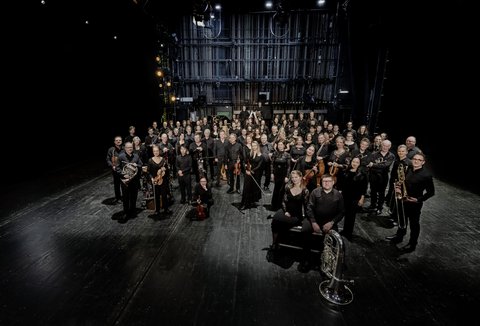Together with the audience, the Beethoven Orchestra Bonn and its conductor Dirk Kaftan discover musical worlds from all epochs and cultures at the highest level.
The orchestra sees itself as a passionate ambassador for Beethoven – both in the city and out into the world. In addition to its work with international soloists, the orchestra focuses on the development of historical repertoire in the Hofkapelle series, on intercultural projects, and on participatory and educational concerts (OpenPhil, b+, etc.). The orchestra and conductor try out unusual concert formats and work with cooperation partners to find contemporary ways of communicating artistic content.
In the past, the orchestra’s work has been exemplified by extraordinary concert projects and various award-winning recordings, such as Maurice Ravel’s Daphnis et Chloé and the opera Irrelohe by Franz Schreker. The first joint production with Dirk Kaftan, Beethoven’s Egmont, was critically acclaimed and awarded the OPUS KLASSIK in 2020.
The orchestra’s history dates back to 1907, when Beethoven’s city once again established its own orchestra following the dissolution of the Hofkapelle in 1794. Conductors such as Richard Strauss, Max Reger, Dennis Russell Davies, Marc Soustrot, Roman Kofman and Kurt Masur established the orchestra in the top class of orchestras in Germany. Since the beginning of the 2017/2018 season, the Beethoven Orchestra Bonn has been under the direction of Dirk Kaftan; before that, the Swiss Stefan Blunier (2008–2016) and Christof Prick (2016–2017) steered the orchestra’s fortunes.
Successful concerts and guest appearances far beyond the borders of Germany contributed to the orchestra’s good reputation.
In early 2021, the Beethoven Orchestra was named a United Nations Climate Change Goodwill Ambassador by the UN Climate Change Secretariat (UNFCCC). This enables the orchestra to work together with the Climate Secretariat to develop new forms of sustainable cultural work in line with the UN’s 17 Sustainable Development Goals formulated in 2017.
